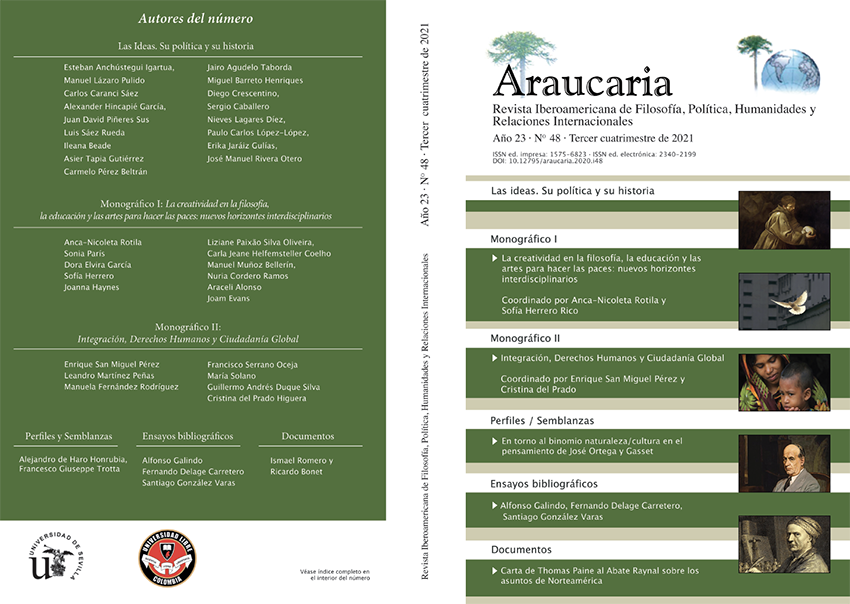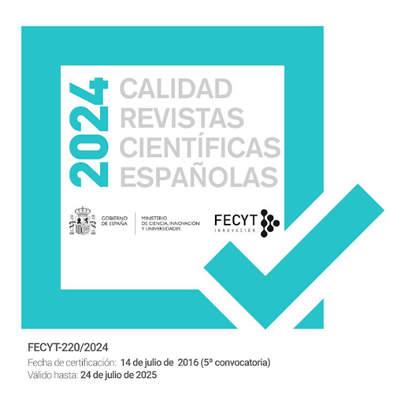The Heideggerian Forgetting of the Being (as Intensive Genesis). About the Phenomenological- Aleteiological Dissolution of Physis
DOI:
https://doi.org/10.12795/araucaria.2021.i48.04Keywords:
Heidegger, diferencia óntico-ontológica, con Heidegger contra HeideggerAbstract
The essay starts from the Heideggerian conception of being as a difference with a phenomenological-aleteiological character, that is, as an event of sense and of the truth of being. The author defends that it is possible to think an ontic-ontological difference with a genetic-intensive character that cannot be reduced to the previous one and is inherent in the notion of physis. Heidegger, according to the central thesis, dilutes the second in the first, offering as the only alternative a devalued understanding of genesis as ontic becoming, an alternative that links to the forgetting of being. Therefore, and despite himself, he forgets being, understood in a genetic and differential way. This forgetting is analyzed in various contexts: that of Heidegger's confrontation with Nietzsche, that of his interpretation of becoming and that of his assimilation of german idealism. By characterizing being as genesis, the author inserts various points of view of G. Simondon, G. Deleuze, Schelling and Hölderlin.
Downloads
Metrics
References
Acosta López, M. d. R. (2009): “The secret that is the work of art: Heidegger’s Lectures on Schiller”, Phenomenology, 39, 135-163.
Ávila Vázquez, M. O. (2011): “En torno a la sentencia de Anaximandro. Dos interpretaciones o sobre la injusticia y la reparación”, Universitas Philosophica, 56 (28), 61-83.
Calvo Martínez, T. (2000): “La noción de physis en los orígenes de la filosofía griega”, Daímon, 21, 21-38.
Deleuze, G. (2015): La subjetivación. Curso sobre Foucault, Buenos Aires, Cactus.
Deleuze, G. (2002): Diferencia y repetición, Buenos Aires, Amorrortu.
Deleuze, G. (1989): Lógica del sentido, Barcelona, Paidós.
Deleuze, G. (1986a): Nietzsche y la filosofía, Barcelona, Anagrama.
Deleuze, G. (1986b): La imagen-tiempo: Estudios sobre cine 2, Barcelona, Paidós.
Deleuze, G. (1984): La imagen-movimiento: Estudios sobre cine 1, Barcelona, Paidós.
Fichte, J. G. (2005): Fundamento de toda la doctrina de la ciencia, Pamplona. [orig.: 1794]
Foucault, F. (1991): “Nietzsche, la genealogía, la historia”, en Microfísica del poder, Madrid, La Piqueta.
Heidegger, M. (2005a): Parménides, Madrid, Akal. [GA 54, orig.: 1942-43]
Heidegger, M. (2005b): Übungen für Anfänger. Schillers Briefe über die ästhetische Erziehung des Menschens. Wintersemester 1936/37, Deutsche Schillergesellschaft, Marbach am Neckar.
Heidegger, M. (2003): Aportaciones a la filosofía. Acerca del evento, Buenos Aires, Almagesto. [GA 65; orig.: 1936-38]
Heidegger, M. (2001a): “Ciencia y meditación”, en Conferencias y artículos, Barcelona, Serbal, 33-51. [GA 7; orig.: 1936-1952]
Heidegger, M. (2001b). Introducción a la metafísica, Buenos Aires, Nova. [GA 40; orig.: 1935]
Heidegger, M. (2000a): Nietzsche, Barcelona, Destino. [GA 6; orig.: 1936-1946]
Heidegger, M. (2000b): “Sobre la esencia y el concepto de la physis. Aristóteles, Física B, 1”, en Hitos, Madrid, Alianza [GA 9; orig.: 1939]
Heidegger, M. (2000c): “Carta sobre el ‘humanismo’”, en Hitos, Madrid, Alianza, 259-298. [GA 9; orig.: 1946]
Heidegger, M. (1998): “La constitución onto-teo-lógica de la metafísica”, en Identidad y diferencia, Barcelona, Anthropos, 99-158. [GA 11; orig.: 1957]
Heidegger, M. (1995): “La sentencia de Anaximandro”, en Caminos del bosque, Madrid, Alianza, 239-277. [GA 5; orig.: 1946]
Heidegger, M. (1993): Interpretaciones sobre la poesía de Hölderlin, Barcelona, Ariel. [GA 4; orig.: 1936-68]
Heidegger, M. (1989): Conceptos fundamentales, Madrid, Alianza. [GA 51; orig.: 1941]
Heidegger, M. (1985): Schelling y la libertad humana, Caracas, Monte Ávila. [GA 42 y 49; orig.: 1936]
Heidegger, M. (1968): “El final de la filosofía y la tarea del pensar”, en VVAA, Kierkegaard vivo, Madrid, Alianza, 130-153. [GA 14 1; orig.: 1964]
Heidegger (1951): El ser y el tiempo, México, F.C.E. [GA 2; orig.: 1927]
Hölderlin, F. (1976): Ensayos, Madrid, Hiperión. [SWgSA, 4]
Llorente Cardo, J. (2012): “Entre lo orgánico y lo aórgico: figuras de la reconciliación en las teorías estéticas de Schiller y Hölderlin”, Contrastes, XVII, 179-195.
Nietzsche, F. (2003): Los filósofos preplatónicos, Madrid, Trotta.
Nietzsche, F. (2002): El nacimiento de la tragedia, Madrid, Alianza.
Nietzsche, F. (1986): Fragmentos póstumos (IV). 1885-1889, Madrid, Tecnos.
Rojas Jiménez, A. (2012). “La influencia de Schelling en la lección de Heidegger de 1942/43”, Thémata. Revista de Filosofía, 45, 383-394.
Schelling, F.W.J. (2000): Investigaciones filosóficas sobre la esencia de la libertad humana y los objetos con ella relacionados, Barcelona, Anthropos. Ed. bilingüe. [SW. VII; orig.: 1807]
Schelling, F.W.J. (1988): Sistema del idealismo trascendental, Barcelona, Anthropos. [SW. III; orig.: 1800]
Schiller, J. C. (1990): “Cartas sobre la educación estética del hombre”, en Escritos sobre Estética, Madrid, Tecnos.
Segura Peraita, C. (2018): “Heidegger, 1931-1939: interpretaciones sobre la kínesis. Hacia una ontología dinámica y aleteiológica”, Discusiones Filosóficas, 19 (32), 135-150.
Simondon, G. (2009): La individuación a la luz de las nociones de forma y de información, Buenos Aires, Cactus/La Cebra.
Downloads
Published
How to Cite
Issue
Section
License
Las ediciones impresa y electrónica de esta Revista son editadas por el Secretariado de Publicaciones de la Universidad de Sevilla, siendo necesario citar la procedencia en cualquier reproducción parcial o total.Salvo indicación contraria, todos los contenidos de la edición electrónica se distribuyen bajo una licencia de uso y distribución “Creative Commons Atribución-NoComercial-SinDerivar 4.0 Internacional”
Accepted 2020-12-06
Published 2021-11-27
- Abstract 1361
- PDF (Español (España)) 318










